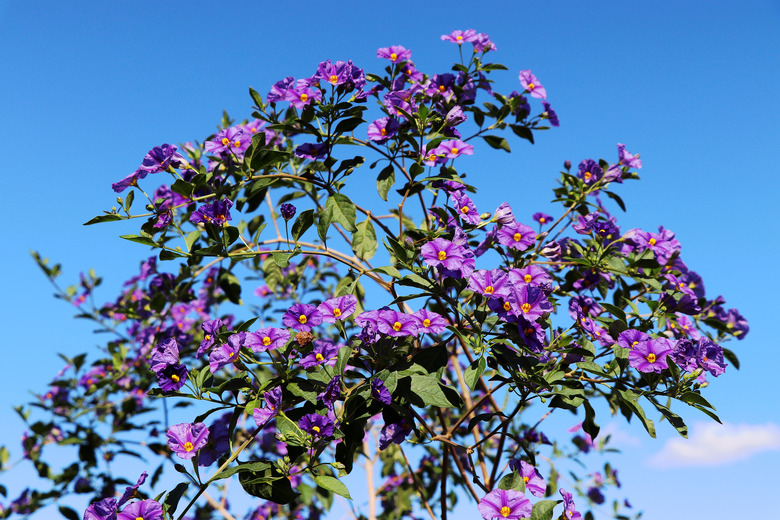How To Propagate A Potato Bush
You can propagate a potato bush, which actually is a small tree, to multiply the beauty in your flower garden by taking cuttings. The potato bush (Lycianthes rantonnetii), also known as Paraguay nightshade or blue lycianthes, is a tender perennial in the same plant family (Solanaceae) as potatoes (Solanum tuberosum). Potato bush is hardy only in U.S. Department of Agriculture plant hardiness zones 9 through 11. It grows to a potential height of 25 feet with a spread of about 30 feet. The potato bush has blue-violet or purple flowers, and it flowers repeatedly. Take cuttings from mid-July to early fall.
Things Needed
-
Well-draining potting soil
-
Glass of water
-
Pencil
-
Drainage rack
-
Container
-
Clear plastic bags
How to Propagate a Potato Bush
1. Water the Shrub
Water the shrub the evening before taking any cuttings.
2. Prepare a Pot
Fill a 6-inch pot with well-draining potting mix. Three or four cuttings can be put into each pot. If you will have more cuttings than that, fill as many pots as you will have cuttings to fill.
3. Find the Best Stems
Examine a stem of the potato bush in the morning to find where the stem color changes from green to brown. The semi-hardwood is formed on the current season's growth. The wood will be firm and the leaves will be normal size.
4. Cut the Stems
Cut a 4- to 6-inch cutting with pruning shears where the stem has semi-hardwood. Cut the stem right below a leaf node.
5. Remove Lower Leaves
Remove the leaves from the bottom half of the stem. Leave at least 2 leaves at the top of the cutting.
6. Dip Cutting in Water
Dip the cut end in a glass of water. Shake the cutting to remove the excess water.
7. Use Rooting Hormone
Dip the wet end into rooting hormone powder. Shake the cutting to remove the excess rooting hormone.
8. Make Holes in the Soil
Poke 3 to 4 holes into the potting soil with a pencil. Space the holes equally.
9. Insert the Cuttings in Soil
Insert the end of the cutting with the rooting hormone into the hole. Firm the soil around the stem with your fingers to hold it in place.
10. Water the Cuttings
Water the soil until thoroughly saturated. The water will run out the drainage hole at the bottom of the pot. Place the pots on a rack over a container so all the water can drain away into the container below.
11. Cover the Pot
Place a clear plastic bag over the top of each pot.
12. Choose a Warm, Bright Spot
Place the pots in a warm, bright area. Don't place them in direct sunlight or the cuttings will become too hot.
13. Keep Soil Moist
Check the soil daily and add water to keep the soil moist. Don't add so much that the soil is soggy, or the cuttings will rot.
14. Check for Roots
Test the cuttings after a month for roots by pulling gently on the stem cutting. If it moves easily, the roots have not formed. Remove the plastic bag when the roots have formed.
15. Transplant the Cuttings
Transplant the cuttings into individual pots when their roots are 1/2 to 1 inch long. Keep the planting depth the same and continue to grow them in a bright location. Continue growing the cuttings in containers for 1 year to increase their chances of survival.
